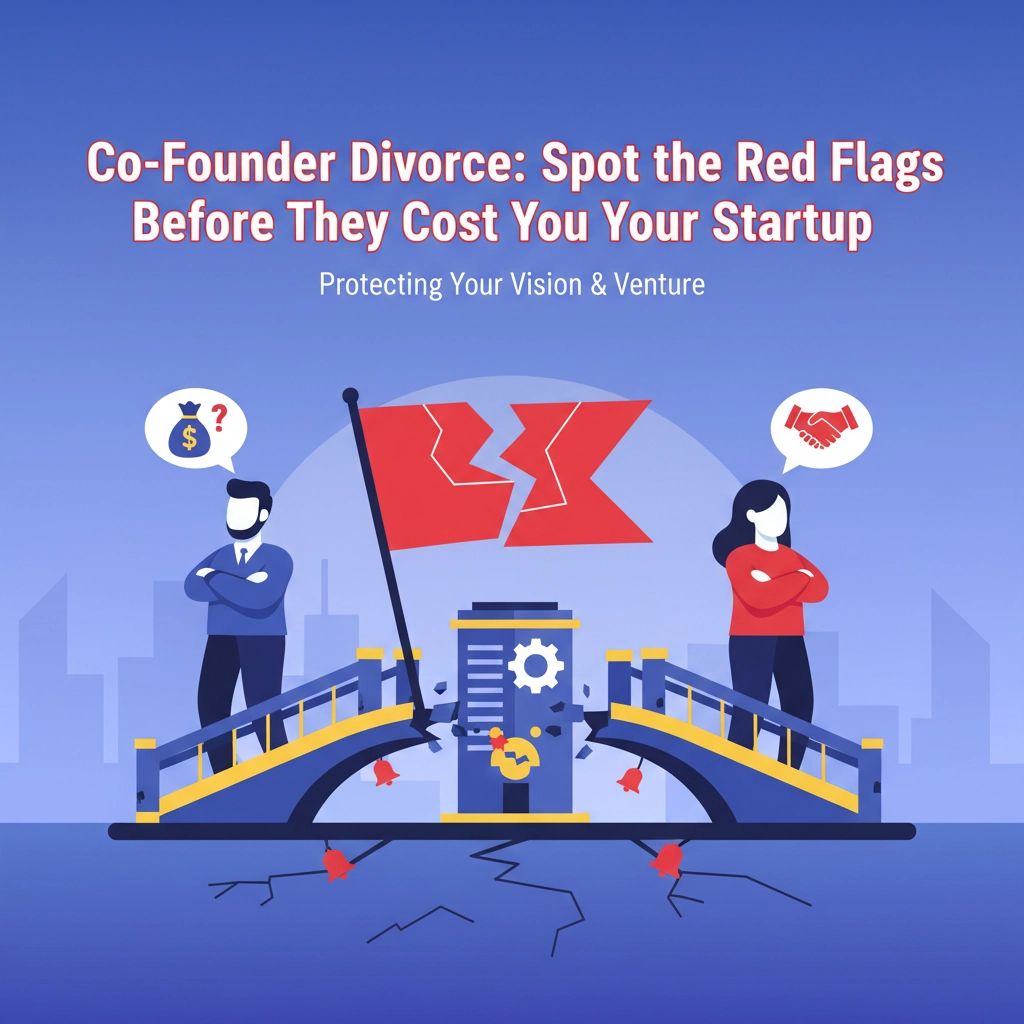Co-Founder Divorce: Spot the Red Flags Before They Cost You Your Startup
Oct 30, 2025
Sarah thought she'd found the perfect co-founder. Her biotech startup had the science locked down, and her business-focused partner brought exactly what she needed: connections, fundraising experience, and operational know-how. Six months later, they weren't speaking. The company folded, taking $500K of seed funding and two years of breakthrough research with it.
The brutal truth? 65% of startups fail due to co-founder conflict. For deeptech and healthtech founders, where the stakes are higher and the timelines longer, a co-founder divorce doesn't just kill your company: it can destroy years of research, regulatory progress, and relationships that took decades to build.
But here's what most founders miss: the warning signs show up months (sometimes years) before the explosion. The key is knowing what to look for and having systems in place to catch problems when they're still fixable.
The Most Dangerous Red Flags (And Why Deeptech/Healthtech Founders Miss Them)
Red Flag #1: The Expertise Imbalance
What it looks like: During investor meetings, one founder consistently dominates. Maybe the business co-founder answers technical questions that should go to the scientist, or the technical founder starts talking market strategy without deferring to their partner.
Why it's deadly in deeptech/healthtech: VCs are specifically watching for this dynamic because it signals deeper problems. In sectors where technical credibility is everything, investors need to see that both founders truly understand their domains: and respect each other's expertise.
Real example: I watched a healthtech pitch where the CEO kept interrupting the CTO during questions about their AI diagnostic platform. The technical details were wrong, the CTO looked frustrated, and the investors passed. Two months later, the CTO left to start a competing company.

Red Flag #2: The Knowledge Gap
What it looks like: One founder can't articulate basic details about costs, customer acquisition, or fund allocation. They defer everything to their partner with phrases like "John handles all that" or "Sarah knows the numbers better."
Why deeptech/healthtech founders fall into this trap: The technical complexity is so high that it's tempting to create rigid silos. The scientist focuses on R&D, the business person handles everything else. But this creates dangerous blind spots.
The test: Both founders should be able to answer these questions in any investor meeting:
- What's our monthly burn rate and runway?
- Who are our first 10 customers and why will they pay?
- What's our regulatory pathway and timeline?
- How much will it cost to reach our next major milestone?
Red Flag #3: The Honesty Problem
What it looks like: Inflated metrics, manipulated timelines, or selective data presentation. Maybe your co-founder tells investors the prototype is "nearly ready" when you know it needs six more months of work.
Why it's especially toxic in regulated industries: Healthtech and deeptech companies face intense scrutiny from regulators, investors, and partners. A co-founder who bends the truth about milestones will absolutely bend the truth during equity disputes, IP battles, or exit negotiations.
The early warning: Pay attention to how your co-founder talks about progress in internal meetings versus external presentations. Any gap between private reality and public narrative is a massive red flag.
Red Flag #4: Lifestyle Misalignment Under Pressure
What it looks like: As the company grows and demands intensify, one founder becomes completely consumed while the other tries to maintain work-life balance. Resentment builds on both sides.
The deeptech/healthtech amplifier: Long development cycles mean this tension lasts for years, not months. When your healthtech device won't launch for three years, and your co-founder is working 80-hour weeks while you're trying to see your kids, someone's going to crack.
The Hidden Costs Nobody Talks About
When co-founder disputes escalate, the damage goes far beyond hurt feelings. Here's what you're actually risking:
Equity destruction: Courts often award substantial ownership interests to departing co-founders or their spouses. Even seed funding received during the partnership is typically considered shared property subject to division.
IP complications: In deeptech and healthtech, intellectual property is everything. Co-founder disputes can freeze patent applications, muddy invention ownership, and create legal clouds that make your company uninvestable.
Regulatory reset: FDA approvals, clinical trials, and regulatory submissions often list specific individuals. Losing a co-founder can mean restarting processes that took years to advance.
Investor confidence collapse: Nothing kills fundraising momentum like visible founder conflict. VCs talk, and word spreads fast about teams that can't work together.

The Prevention Framework: The Alignment Audit
Smart founders don't wait for problems to emerge. They build systems to catch misalignment early. Here's the framework I use with deeptech and healthtech clients:
Monthly Founder Check-ins
The Process: Schedule 60 minutes monthly (outside normal operations) to discuss:
- Are we equally excited about our current direction?
- What decisions this month felt like we weren't aligned?
- Where do we see the company in 12 months, and are those visions compatible?
- What's frustrating you about our partnership right now?
The key: Make it safe to voice concerns. Small irritations become massive conflicts when they fester for months.
Quarterly Role Clarity Reviews
The Process: Every three months, explicitly discuss:
- Who's making what decisions?
- Are there areas where we're stepping on each other's toes?
- What new responsibilities need clear ownership?
- Are we both growing in ways that serve the company?
Why it matters in regulated industries: As your healthtech or deeptech company grows, regulatory requirements, investor relations, and technical decisions become more complex. Role confusion becomes exponentially more dangerous.
The "Stress Test" Conversation
When to do it: Before major milestones (funding rounds, clinical trials, product launches)
What to cover: How will we handle decisions if we disagree? What happens if one of us wants to leave? How do we protect the company if our personal relationship changes?
This isn't pessimistic: it's professional. The best co-founder relationships have explicit agreements about how to handle conflicts before they arise.
Early Intervention: When You Spot the Red Flags
Seeing warning signs doesn't mean your partnership is doomed. But it does mean you need to act fast. Here's your intervention playbook:
The Reset Ritual
Week 1: Each founder independently writes down their biggest concerns about the partnership and the company direction. No editing, no diplomacy: just honest assessment.
Week 2: Share lists and discuss without defending. The goal is understanding, not agreement.
Week 3: Identify three specific changes you'll both make in the next 90 days. Get external help if needed: consider bringing in a startup coach or advisor to facilitate.
The Equity Conversation
If trust is breaking down, revisit your equity split and vesting schedules. Many co-founder divorces happen because the original agreement no longer feels fair as the company evolves.
Key questions:
- Does our current equity split reflect our actual contributions?
- Are our vesting schedules aligned with our commitment levels?
- Do we have clear exit procedures that protect both parties?
The Outside Perspective
Bring in trusted advisors who know both founders and can provide objective feedback. Sometimes conflicts that feel enormous internally look manageable to an outside observer: and sometimes the reverse is true.

The Bottom Line
Co-founder divorce doesn't just kill startups: it destroys years of scientific progress, regulatory advancement, and market positioning that can never be recovered. For deeptech and healthtech founders, where the path to market is measured in years, not months, partnership stability isn't just nice to have: it's existential.
The good news? Most co-founder conflicts are preventable with early detection and honest communication. The founders who build legendary companies aren't the ones who never disagree: they're the ones who've built systems to address disagreements before they become destructive.
Your breakthrough technology deserves co-founders who can work together long enough to bring it to market. Don't let preventable relationship problems kill what could be a world-changing company.
Ready to build the partnership systems that protect your startup? Join other deeptech and healthtech founders who are creating businesses built to last. Get access to our founder alignment frameworks and start protecting your partnership today.